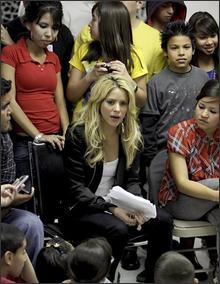Shakira is shaking it up politically! The bombshell superstar Latin singer from Colombia visited Phoenix on Thursday, stepping right into the eye of the storm on immigration, and wasting no time. (Watch her on YouTube!)”I’m here pretty much undocumented,” she told a crowd at the Carl Hayden Youth Center as they screamed her name and took photos of her with cameras and cell phones.
She met with the city’s police chief and mayor over concerns that a sweeping new state law cracking down on illegal immigration will lead to racial profiling.The Grammy winner said she wanted to learn more about how the law will be implemented if it goes into effect this summer and to meet with Phoenix’s Latino community.”I heard about it on the news and I thought, ‘Wow,'” Shakira told The Associated Press after meeting with city officials. “It is unjust and it’s inhuman, and it violates the civil and human rights of the Latino community … It goes against all human dignity, against the principles of most Americans I know.
“”I’m not an expert on the Constitution but I know the Constitution exists for a reason,” Shakira told reporters after meeting with city officials. “It exists to protect human beings, to protect the rights of people living in a nation with or without documents. We’re talking about human beings here.”Shakira also made a stop at the state Capitol in downtown Phoenix, telling a group of a few hundred community members that if the law were in effect, she could be arrested since she didn’t bring her driver’s license to Arizona.She called on the U.S. Congress to work on immigration reform. “No person should be detained because of the color of their skin,” she said.
The law, signed Friday by Republican Gov. Jan Brewer, is viewed as the toughest on illegal immigration in the nation and has drawn criticism from President Barack Obama, who questioned its legality. The law makes it a state crime to be in the U.S. illegally and directs police to question people about their immigration status if there is reason to suspect they’re illegal immigrants.
The new law thrust Arizona into the international spotlight last week, with civil rights leaders and others demanding a boycott of the state, and the Mexican government warning its citizens about an “adverse political atmosphere” in Arizona. At least three Arizona cities are considering lawsuits to block the law, and there are two efforts to put a referendum on Arizona’s November ballot to repeal it.Shakira also sought to meet with Brewer during her visit to Phoenix but was told the governor’s schedule was booked, said Trevor Nielson, the singer’s political and philanthropic adviser.Shakira is perhaps best known for her nimble dance moves and songs including “Hips Don’t Lie” and “She-Wolf,” but recently she has become more active in political and social issues.
http://www.youtube.com/v/H7l93bvMiQY&rel=0&fs=1http://www.youtube.com/v/9TJVU7yF6UM&rel=0&fs=1



